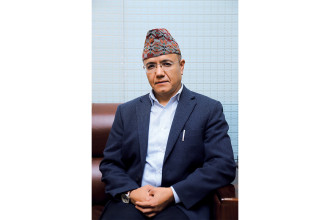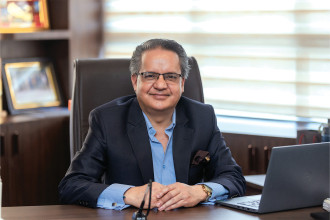
Shishir Khanal is the Co Founder and CEO of Teach For Nepal, a movement of outstanding university graduates and young professionals who are committed to end education inequity in Nepal starting with two years of fellowship teaching in public schools.
Teach For Nepal fellowship is a two year long, full-time paid employment opportunity. During the two years, Fellows teach in public schools and bring about academic achievement and transformative impact in their students. At the same time, they harness their leadership skills through the teaching experience and intensive development training and support.
Shishir lived and went to school in different parts of Nepal and came to Siddhartha Vanasthali in Kathmandu for his secondary education. He then did his intermediate studies with Tri-Chandra College and then went to the University of Bridgeport in Connecticut, USA for his Bachelor’s degree in International Political Economy and Diplomacy (IPED). He later attained a Masters degree in International Public Affairs (MIPA) at the University of Wisconsin-Madison in Madison, Wisconsin, USA. After graduate school, Shisir worked as Executive Director of Sarvodaya USA, a Madison based non-profit organisation that supported Sri Lanka’s largest community based organisation called Sarvodaya Shramadana Movement. He led fundraising and outreach in the US for post-tsunami reconstructions activites. Inspired by the work of Sarvodaya, with a few friends, they started Sarvodaya Nepal and began to work for rural communities in Nepal. This experience deeply impacted and led Shisir to co-found Teach For Nepal. Since 2012, he has been leading Teach For Nepal as its CEO.
“The idea and belief that people are born to be a leader is a medieval and feudal idea. This idea has already been challenged. I definitely do not believe this. Our understanding at Teach For Nepal is everyone can lead at anytime”.
For a person deeply passionate about making quality education available to all children of Nepal, Shishir is today considered an intensely positive role model. His imprint on the fellows of TFN and the young students spread across Nepal, his work in raising funds and working with national and international development partners tells us about the versatility of his leadership. In this edition of Business 360, Shishir Khanal talks about different aspects of leadership. Excerpts:
What is your definition of leadership?
To me, leadership is a journey of transformation of self and others while working to achieve common and purposeful goals.
How is being a leader different to being a boss?
In our mental model, we see a boss as being very directive and authoritative. The word even conjures up a mean, screaming face person. Leaders, on the other hand, are seen as people who n inspire others. To run an organisation, one has to be both inspiring and directive. In today’s context, a good leader needs to actively nurture leadership of others, especially your team members. As I lead, if I can groom, mentor and support other people around me to become better than I am, only then I might call myself a successful leader.
Have any of your personal experiences helped you become a better leader? Could you give us some examples from your formative years.
I am not sure I can claim myself to be a good leader. But, my leadership has come from a lot of practice. This practice has come from early years, especially from school years. Some of the early leadership experience is being class monitor. Since I was a good student in school, I was often appointed as a monitor of the class. I wasn’t the tallest or the biggest kid in the class, but honestly, I enjoyed the power and authority that came with the title. The power, then gave confidence, even to talk, argue and control other kids who were bigger, taller and stronger. I also was active outside of the classroom, often taking part in extra-curricular activities. Early years, leadership to me meant taking control of others. But, through readings and experiential learning I have come to see and feel that it is to work and serve others. I have seen my own thinking evolve over time. I have also always have had a strong value based positions and stood by them.
To share an example, when in college in the US, I used to be the president of college club. We used to organise one of the largest on-campus cultural events. When I had started as the president, we didn’t have much money in the club’s account. After I became the president over a period of a year, we did a number of projects and ended up having substantial amount of money in our account. There was a discussion on the use of the money. As young college kids, partying was the biggest thing. Many of the members thought we should organise a party – and college party involved alcohol. However, my position was that we shouldn’t use money on alcohol and just one time fun. I took a very strong position there. This eventually led to all of us deciding to go on a ski trip. For many that was their first ski trip. Should we have decided to spend the money on one night of partying, it may have been just a fun night, but no different from any other weekend night in American colleges. The experience of going to ski for the first time is remembered by many still.
Such value based decisions and leadership continue to shape my leadership even today.
When was the last time a staff member approached you with a unique idea? What did you do?
This happens fairly regularly. I have weekly check-ins with my team members and their ideas. What happens next is largely dependent on the idea. If the idea seems feasible and easily implementable, we try to implement immediately. If the idea needs refinement and needs more thought, I ask and challenge team members to research, think more and come with some plan and evidence. This then leads to one of two paths, that we realise the idea isn’t feasible or needs more time/resources than we can afford at this time. Which means it goes into the back-burner. If we find out an impactful and efficient way to implement, then we take that into implementation.
Do you agree with the statement that leadership is an in-born trait?
The idea and belief that people are born to be a leader is a medieval and feudal idea. This idea has already been challenged. I definitely do not believe this. Our understanding at Teach For Nepal is everyone can lead at anytime. I tell our Fellows that you don’t even need a title or authority to change. As a TFN Fellow, you can lead at anytime. Your students can lead. And, this is what we are about – to establish an idea that anyone can lead and if we can be effective at leading collectively, we can change the nation.
What are the constant challenges that non-profit organisation like Teach for Nepal have been facing in Nepal?
From Teach For Nepal’s prospective, as in general non-profit, especially local non profit, finding financial resources to carry on our mission is one of the most challenging parts. It’s in part due to the fact that we have very little giving culture in Nepal both at individual, private and public levels. This compounded by the fact that all non-profit regardless of their impact is put in one basket and called “dollar wala.” In many developed countries, public (government) sees non-profit organisations as complementary to the work of government; however, in Nepal, we see non profit organisations as competition. The corporate philanthropy is just beginning to emerge, but most people confuse CSR with marketing; moreover corporations have very little interest in long term sustainable growth of the economy and community but get involved in things that create short term mileage.
In countries like America, where I studied and led a nonprofit, individual giving is about 75% of non-profit income. Giving to a nonprofit organisation is a foreign idea in Nepal. Thus, this significantly limits how non profit can generate revenue. Then the only option is to rely on foreign funding, which then comes as I said earlier with a “dollar wala” label. I, however, feel fortunate that we are innovating a lot on this front and are on the forefront of raising local funds. We plan on raising 60% of our funds from Nepal and the Nepali community this year.
Additionally, legal requirement on receiving funds, monitoring, and renew are also cumbersome processes for non profits. Sometimes you are asked for all kinds of documents from local level to district institutions from sectoral office (for example, Education Office) and then DDC to CDO office, which can take months. I wish there were more simpler and streamlined processes. This would help nonprofits to reduce operating expenses and use those valuable donations to the core mission.
Personnel development activities are important if an organisation wants to prosper. Does Teach for Nepal organise such activities?
Our leadership model isn’t about sitting in a class and learning through lectures. It’s hands-on. It’s experiential. We call our Fellowship a leadership program, but we don’t think this to be an end in itself. Fellows learn skill, experience, and mindset to be effective leaders by teaching, working in the community, by living in adifficult context, and driving change. This is backed up by intellectual discourse and dialogue that happens through some of our formal trainings, which we call learning sessions. This same core idea translates into the organisational context also. We promote our team members to learn by doing. There isn’t punishment for failure. We encourage innovation. We give responsibility and trust that the individuals can drive results. As a team leader or manager, I and others lead team support in learning through in-person conversation, coaching and mentoring. When we do not have skill or knowledge, we point to external resources to learn. We also benefit a lot from our global network. We are a member of Teach For All network. Our Team members have opportunities to attend conferences to learn and grow from people around the world.
What is your leadership mantra?
I have always found joy in serving and working with others. I like dialogue and conversations on important issues. Unlike in the past where leadership was seen as top-down, it’s a time for democratic and participatory leadership. It’s not much difficult to find information. It’s difficult to find smart, dedicated, and committed individuals to run institutions. Therefore, to inspire and nurture these future leaders is where I think today’s leadership should pay attention to.
What type of organisational structure is applied at Teach for Nepal?
We have different teams and roles. Since our core work is around recruitment and training of young leaders to serve, two of our largest teams are Training as well as Recruitment and Selection. The rest of the teams are mostly one person units. Team Leaders report to me. Our structure is guided by our programme. However, we are also constantly evolving and changing. This is led by the size and need.






-(1)-1752214965.jpg)